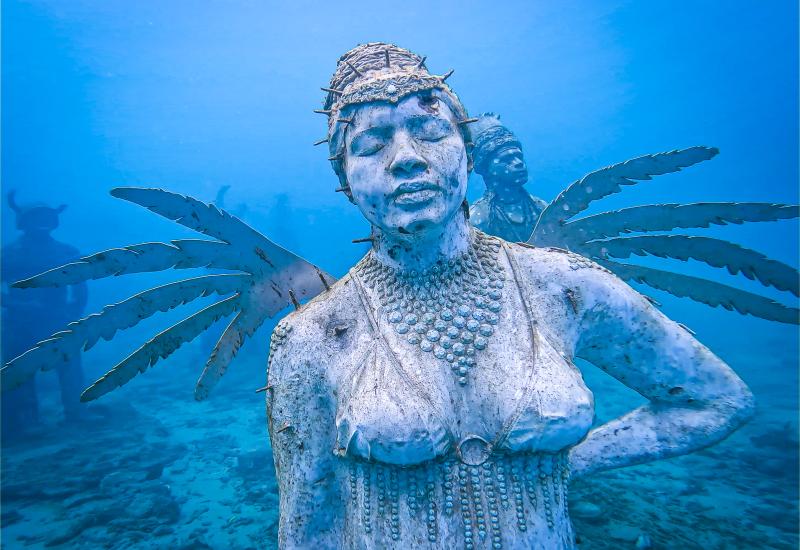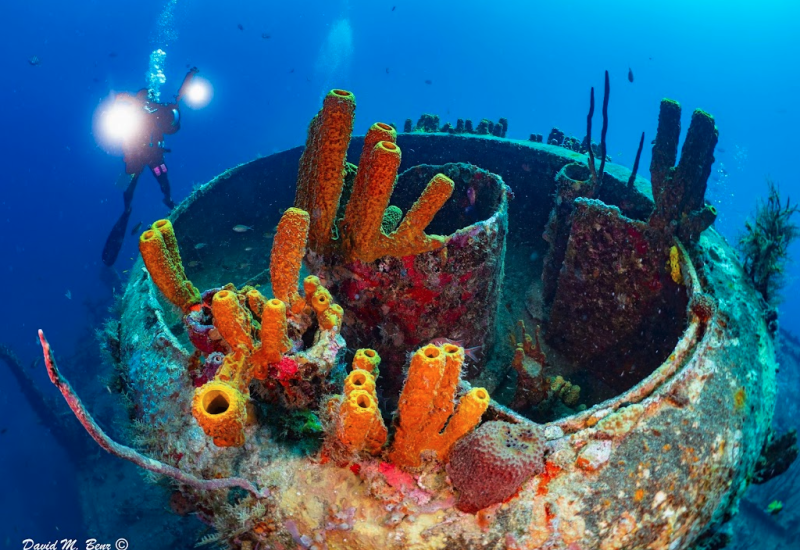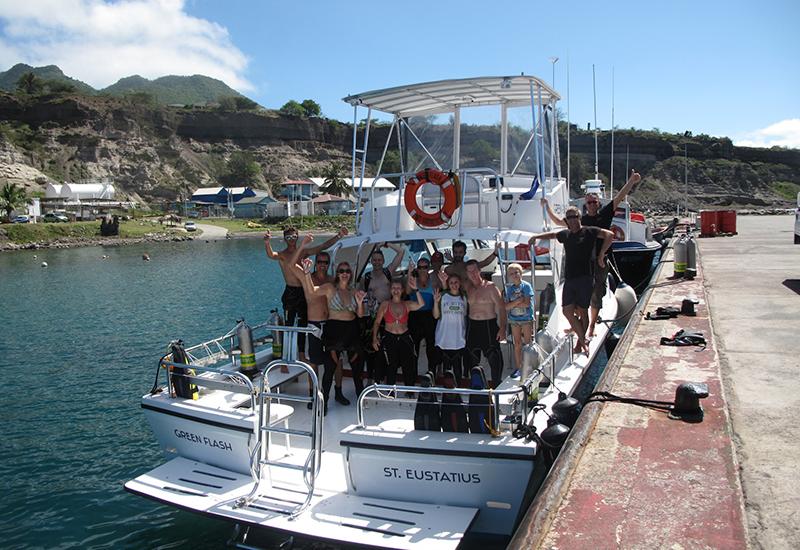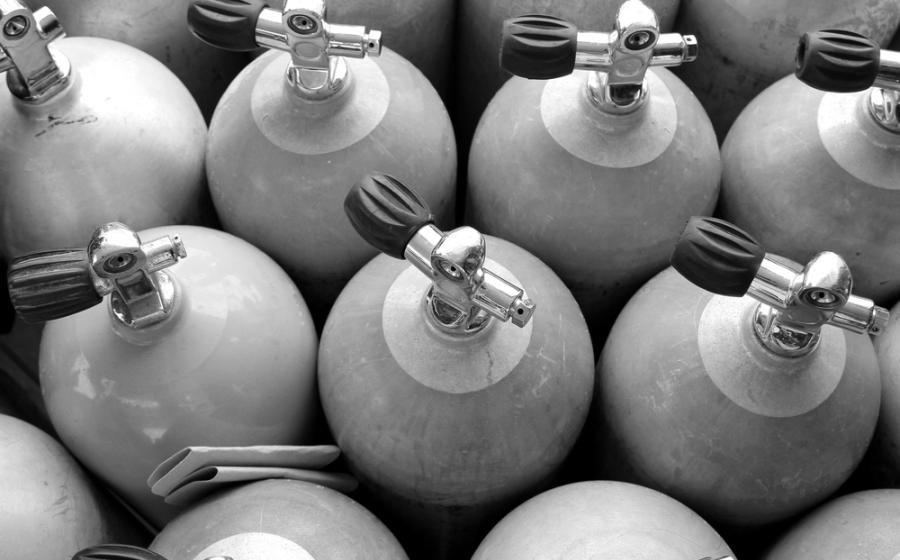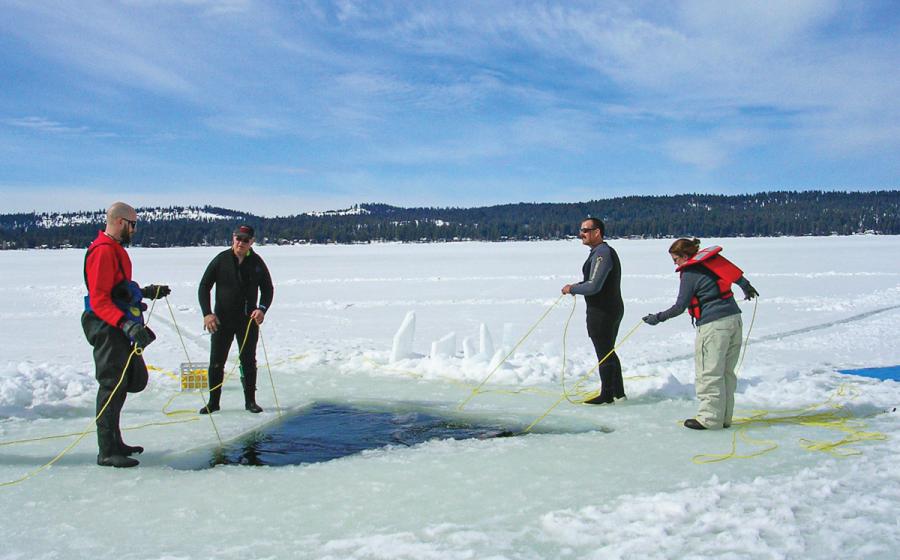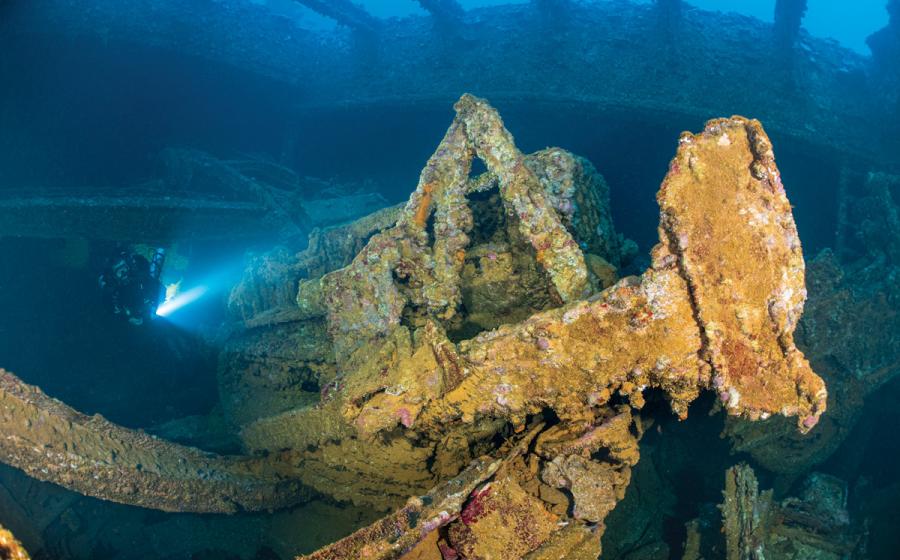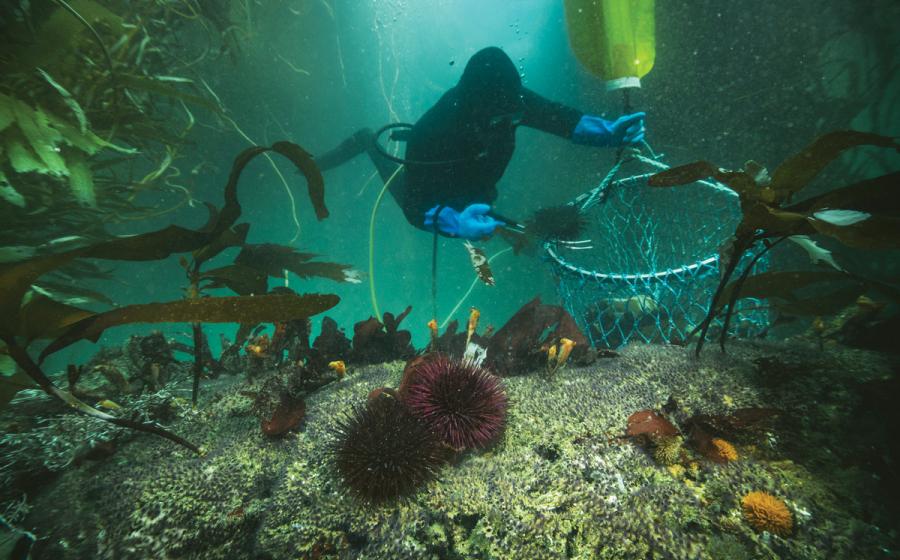Best Scuba Diving in the U.S. Virgin Islands

Soft corals and diver in front of sun rays
Shutterstock
Easy access from the mainland U.S., no passports required for U.S. citizens and a variety of amazing dives, including plunging walls, hulking wrecks and laid-back reefs, make a trip to America's Caribbean a must-do for divers who want to kick back and "lime."
Top 10 Dive Sites
Salt River Canyon
St. Croix's north shore is one of the best-kept secrets in wall diving, and this site has two walls facing each other across a quarter mile of blue water. Hordes of reef fish swarm the tops of the walls, deep-water sea fans and black coral cling to the deeper sections, and big animals like hammerheads and black-tips sometimes make appearances.
Recommended minimum skill level: Intermediate to Advanced
Carval Rock
Drop down on the sheltered south side of this rock formation, then kick hard against the stiff current flowing through "The Cut," a shallow, submerged passage through the rock. Let the current take you 360 degrees around the rock, past dramatic formations and through a narrow canyon packed with baitfish and tarpon. The sheer wall on the east end drops to 80 feet, and the shallow coral gardens on the way back to the boat are good places to look for nurse sharks, reef squid and octopus.
Recommended minimum skill level: Intermediate
WIT Shoal II
This 330-foot freighter and former tank landing ship was first sunk by a tropical storm in 1984, then six months later towed to her current resting place west of Saba Island. The ship sits upright in 90 feet, with the pilothouse starting at 30 feet. Cup corals and sponges encrust the ship, and open holds and companionways provide refuge for grouper and barracuda.
Recommended minimum skill level: Intermediate
Butler Bay Wrecks
These five distinct wrecks clumped together on St. Croix's northwest tip can be done in one dive — if you move fast. Better yet, take it easy and see them all over two dives. The Rosaomaira is the deepest at 110 feet, and the Northwind, once used as a prop in the 1980s television movie Dreams of Gold: The Mel Fisher Story, tops out at 20 feet.
Recommended minimum skill level: Intermediate
French Cap
This small cay south of St. Thomas is too far for most dive boats to visit with any regularity, but when the weather is perfect, special trips do happen and they're worth it. There are a few spots to dive here, and the Pinnacle is one you shouldn't miss. A handful of rock spires shoot up from the 95-foot bottom to about 40 feet. Jacks and barracuda chase swarms of reef fish around the summit. Craggy fissures provide ample nooks for green morays and octopus to hide.
Recommended minimum skill level: Intermediate
Cow and Calf
These sister sites are easily accessible from either St. Thomas or St. John. Both feature undersea playgrounds complete with arches, canyons and swim-throughs at a max depth of 45 feet. At Cow Rock, a tunnel packed with silversides ends with "The Champagne Cork," a vertical opening where the surge pops divers out onto the surrounding staghorn coral reef. Look for gray reef sharks cruising the perimeter.
Recommended minimum skill level: Beginner
Congo Cay
This dive starts in a wide sand channel where large southern stingrays rest and forage for food. Follow your dive guide through a backbone of rock spires to the coral-draped wall. Dolphins sometimes cruise the sand channel surrounding the cay. Depths are between 25 and 80 feet with the best formations and marine life between 35 and 60.
Recommended minimum skill level: Beginner to Intermediate
Frederiksted Pier
Macro life abounds at this simple, but diverse beach dive on St. Croix's western shore. Depths reach 50 feet at the end of the pier, but the pilings in 25 feet or less host an array of hard-to-find critters like seahorses, batfish and frogfish.
Recommended minimum skill level: Beginner
Eagle Shoals
This rarely visited site off the east end of St. John is best known for "The Cathedral," a large, open chamber accessed by multiple entryways. Look up to see streams of sunlight pouring in from the "skylight."
Recommended minimum skill level: Beginner
Tunnels of Thatch
These tunnels on the north side of Thatch Cay are only safe when flat calm surface conditions keep the surge down. You'll meander through a winding path of baitfish- and tarpon-packed canyons and caverns, then explore a sloping, boulder-strewn hillside at depths of 25 to 40 feet.
Recommended minimum skill level: Intermediate
Pre-Dive Check
Country: USA
Primary Languages: English, but locals also speak a Virgin Islands creole.
Currency: U.S. dollar.
Cultural Influences: Danish, American, African.
Signature Dishes: Callaloo, a spinach- or collard greens-based soup, and fungi, a type of cornmeal porridge.
Signature Marine life: Southern stingrays make regular appearances in the sand channels between the reefs, and during the summer, huge tarpon show up to feed on the schools of baitfish.
Topside Sporting Pastime: Sailing. And during the first week in July, St. Croix's Emancipation Day donkey races draw big crowds and even bigger laughs.
Topside Trinkets: Caribbean hook bracelets, Cruzan rum.
Travel Savvy Tip: No passport is required to travel in "America's Caribbean," but bring one along if you want to take a side trip to the nearby British Virgin Islands.
Taking the Plunge
Getting There: Nonstop flights to St. Thomas (STT) and St. Croix (STX) originate from several U.S. gateways, including Atlanta, Miami, Newark, Charlotte and Philadelphia. Several interisland carriers, as well as an interisland ferry and seaplane charters departing from Charlotte Amalie harbor, offer connecting service between St. Thomas and St. Croix. St. John does not have an airport. To get there, fly to St. Thomas and take a taxi to the interisland ferry docks at Red Hook or Charlotte Amalie Harbor.
Weather: Low 60s to mid-70s in winter; mid-80s in summer.
Dive Conditions: Water temps range from the high 70s in winter to mid-80s in summer. Vis averages 60 to 100 feet.
More Information: To learn more about planning your U.S. Virgin Islands dive vacation, log on to the official USVI Department of Tourism web site.
Scuba diving in the U.S. Virgin Islands couldn’t be an easier getaway for U.S. travelers — there’s no passport required and there’s easy access from the mainland. Once there, the wide variety of Caribbean diving keeps good times going, including plunging walls, hulking wrecks and laid-back reefs.
What are you waiting for? Let’s kick back, relax and blow some bubbles!
Scuba Diving in St. Thomas
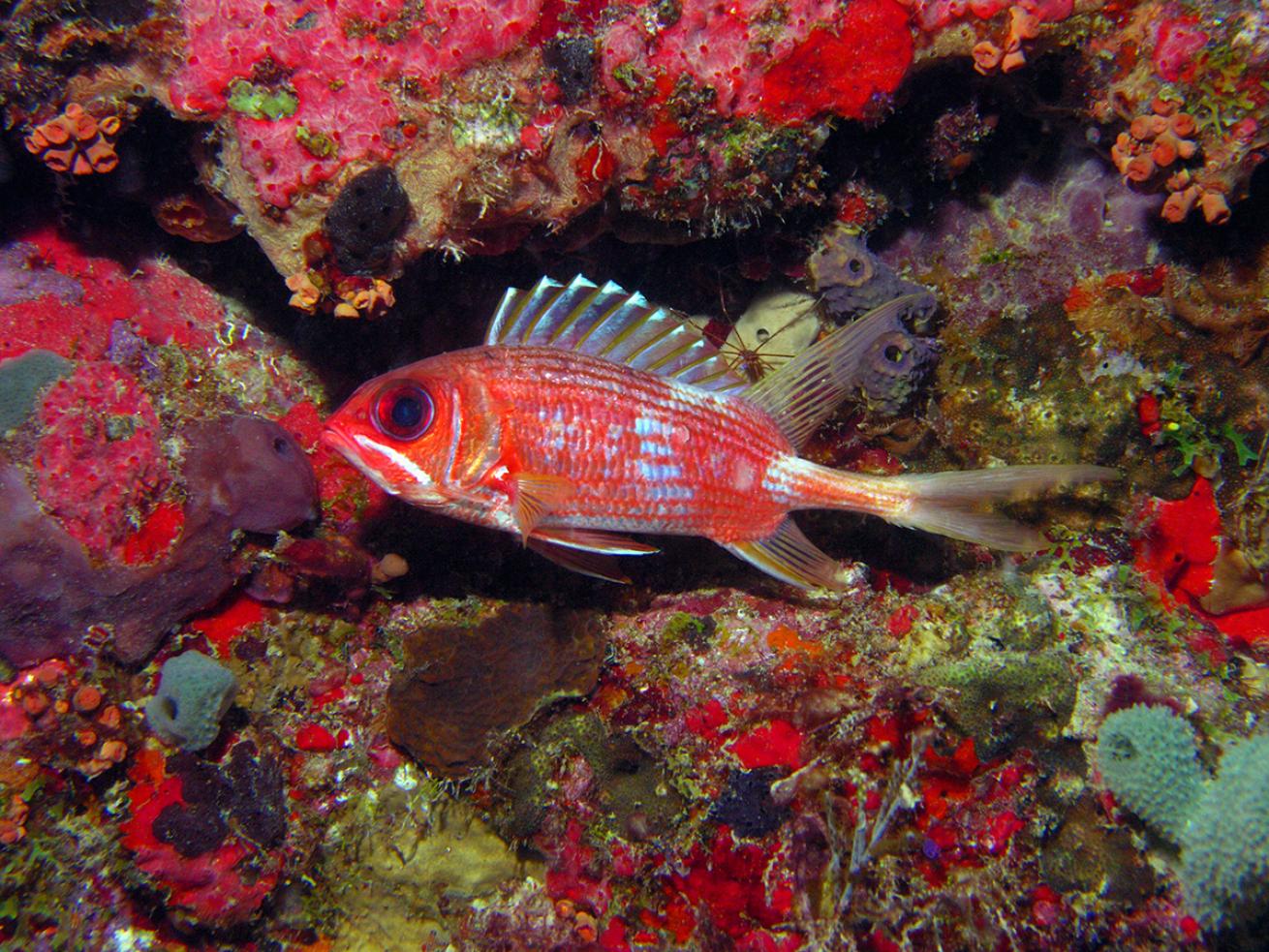
David SamuelA longspine squirrelfish at Thatch Cay in USVI.
WIT Shoal II
This 330-foot freighter and former tank landing ship was first sunk by a tropical storm in 1984, then towed six months later to her current resting place west of Saba Island. The ship sits upright at 90 feet, with the pilothouse starting at 30 feet. Cup corals and sponges encrust the ship, and open holds and companionways provide refuge for grouper and barracuda.
Recommended minimum skill level: Intermediate
French Cap
This small cay south of St. Thomas is too far for most dive boats to visit with any regularity, but when the weather is perfect, the special trips that do happen are worth it. There are a few spots to dive here, but don't miss Pinnacle. A handful of rock spires shoot up from the 95-foot bottom to about 40 feet. Jacks and barracuda chase swarms of reef fish around the summit while craggy fissures provide ample nooks for green morays and octopus.
Recommended minimum skill level: Intermediate
Tunnels of Thatch
The tunnels on the north side of Thatch Cay are only safe when flat calm surface conditions keep the surge down. You'll meander through a winding path of baitfish- and tarpon-packed canyons and caverns, then explore a sloping, boulder-strewn hillside at depths of 25 to 40 feet.
Recommended minimum skill level: Intermediate
Cow and Calf
These sister sites are easily accessible from either St. Thomas or St. John. Both feature undersea playgrounds complete with arches, canyons and swim-throughs at a max depth of 45 feet. At Cow Rock, a tunnel packed with silversides ends with "The Champagne Cork," a vertical opening where the surge pops divers out onto the surrounding staghorn coral reef. Look for gray reef sharks cruising the perimeter.
Recommended minimum skill level: Beginner
Scuba Diving in St. Croix
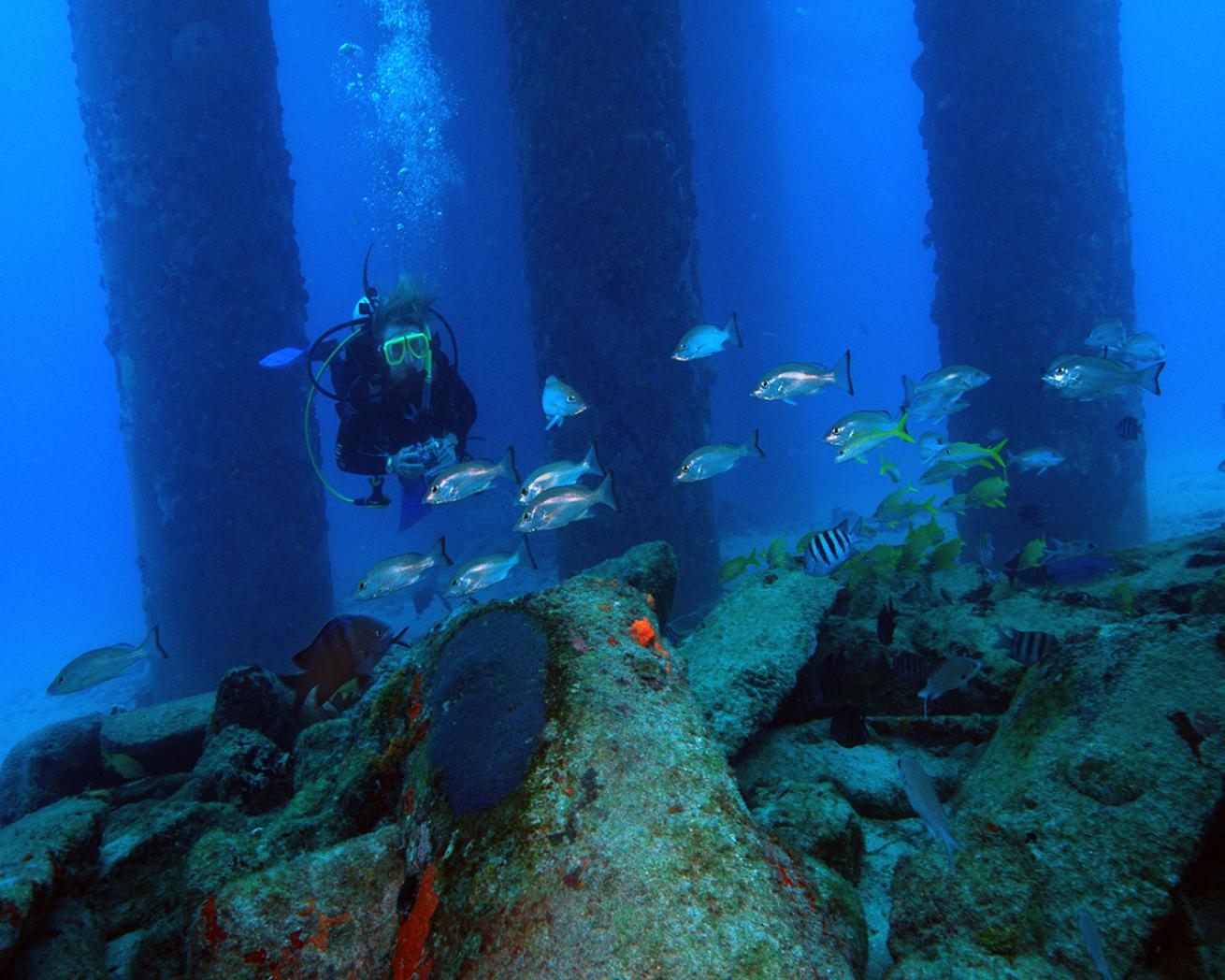
Shutterstock.com/Norm DiverA diver swims beneath the Frederiksted Pier in St. Croix.
Salt River Canyon
St. Croix's north shore is one of the best-kept secrets in wall diving, and this site has two walls facing each other across a quarter mile of blue water. Hordes of reef fish swarm the tops of the walls, deep-water sea fans and black coral cling to the deeper sections, and big animals like hammerheads and blacktip reef sharks sometimes make appearances.
Recommended minimum skill level: Intermediate to Advanced
Butler Bay Wrecks
These five distinct wrecks clumped together on St. Croix's northwest tip can be done in one dive — if you move fast. Better yet, take it easy and see them all over two dives. The Rosaomaira is the deepest at 110 feet, and the Northwind—once used as a prop in the 1980s television movie Dreams of Gold: The Mel Fisher Story—tops out at 20 feet.
Recommended minimum skill level: Intermediate
Frederiksted Pier
Macro life abounds at this simple yet diverse beach dive on St. Croix's western shore. Depths reach 50 feet at the end of the pier, but the pilings in 25 feet or less host an array of hard-to-find critters like seahorses, batfish and frogfish.
Recommended minimum skill level: Beginner
Scuba Diving in St. John
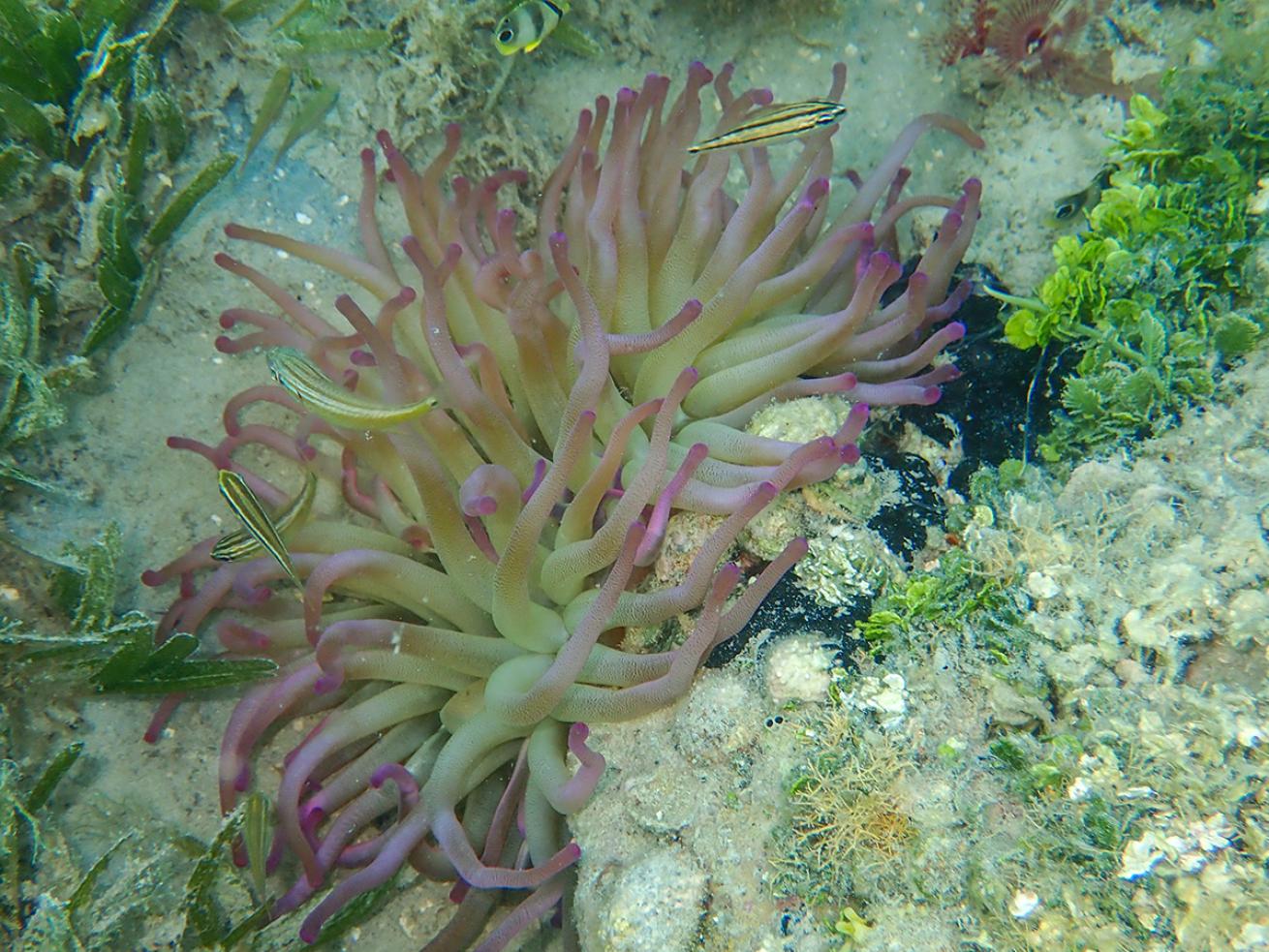
Shutterstock.com/ScottyJ3785A sea anemone in Trunk Bay in St. John
Carval Rock
Drop down on the sheltered south side of this rock formation, then kick hard against the stiff current flowing through "The Cut," a shallow, submerged passage through the rock. Let the current take you 360 degrees around the rock, past dramatic formations and through a narrow canyon packed with baitfish and tarpon. The sheer wall on the east end drops to 80 feet, and the shallow coral gardens on the way back to the boat are good places to look for nurse sharks, reef squid and octopus.
Recommended minimum skill level: Intermediate
Congo Cay
This dive starts in a wide sand channel where large southern stingrays rest and forage for food. Follow your dive guide through a backbone of rock spires to the coral-draped wall. Dolphins sometimes cruise the sand channel surrounding the cay. Depths are between 25 and 80 feet with the best formations and marine life between 35 and 60.
Recommended minimum skill level: Beginner to Intermediate
Eagle Shoals
This rarely visited site off the east end of St. John is best known for "The Cathedral," a large, open chamber accessed by multiple entryways. Look up to see streams of sunlight pouring in from the "skylight."
Recommended minimum skill level: Beginner
Start planning your USVI scuba adventure today with PADI Travel!
Need to Know
Country: USA
Primary Languages: English, but locals also speak a Virgin Islands creole.
Currency: U.S. dollar.
Cultural Influences: Danish, American, African.
Signature Dishes: Callaloo, a spinach- or collard greens-based soup, and fungi, a type of cornmeal porridge.
Signature Marine Life: Southern stingrays make regular appearances in the sand channels between the reefs, and during the summer, huge tarpon show up to feed on the schools of baitfish.
Topside Sporting Pastime: Sailing. And during the first week in July, St. Croix's Emancipation Day donkey races draw big crowds and even bigger laughs.
Topside Trinkets: Caribbean hook bracelets, Cruzan rum.
Travel Savvy Tip: No passport is required to travel in "America's Caribbean," but bring one along if you want to take a side trip to the nearby British Virgin Island.
Weather: Low 60s to mid-70s in winter; mid-80s in summer.
Dive Conditions: Water temps range from the high 70s in winter to mid-80s in summer. Vis averages 60 to 100 feet.
More Information: To learn more about planning your U.S. Virgin Islands dive vacation, log on to the official USVI Department of Tourism website.


